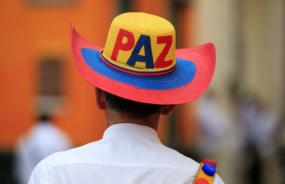The Special Jurisdiction for Peace (JEP) is a model of transitional justice that was conceived by the peace agreements, with the goal of protecting the rights of the victims of the armed conflict between the Colombian government and the FARC. One of the achievements of the peace negotiations was the acknowledgment that not only FARC members should be put on trial for their crimes, but also the Colombian military, police and political representatives.
On November 14, The Senate of the Republic of Colombia passed an act that regulates the Special Jurisdiction of Peace (Jurisdicción Especial de Paz, in Spanish), which is a central figure established by the agreements made between the former Revolutionary Armed Forces of Colombia (FARC)—which have now become a political party under the same acronym—and the government of Colombia, led by Juan Manuel Santos. But the Senate had introduced controversial reforms, such as preventing Human Rights defenders to be magistrates of the JEP.
And the day after that, the public learned about other controversial modifications that the Constitutional Court had made to the JEP.
The Senate Violates the Agreements
On November 14, Senate ruled that magistrates who are part of human rights organizations or have in some way participated in legal actions regarding humanitarian law in national or international courts, are not allowed to participate in the National Jurisdiction for Peace.
Colombian lawyer Alberto Yepes, who is a member of the Colombia-Europe-United States Coordination (CCEEU) says this measure is absolutely unconstitutional, since the promotion and defense of human rights when they are threatened is one of the duties of every citizen according to the Constitution. According to Yepes, this measure stigmatizes and discriminates against human rights defenders, excluding them from the peace process as if they were suspicious or guilty of something. This violates international pacts and treaties that put the defense of human rights as one of the main responsibilities of the states. It also goes against the peace agreements signed by the government and the FARC, which established that all magistrates should have knowledge and experience in the defense and promotion human rights. But this decision by the senate turns this requisite into a criteria for exclusion. Yepes says this is the result of a fear of truth by Colombia’s elites, who have forged a “pact of impunity” to prevent those magistrates with more knowledge about the dynamics of the conflict, about the dynamics of victimization and access to documentation of the cases to participate in the Special Jurisdiction for Peace. Yepes also reminds that human rights defenders are routinely killed in Colombia, so the stigmatization by the Senate adds to this serious situation.
Good News and Bad News from the Constitutional Court
The good news is that on November 15 the Constitutional Court allowed the Integral System of Truth, Justice and Reparation and Guarantees of Non-Repetition to become a part of the Constitution of Colombia. This includes the Truth Commission, the Special Jurisdiction for Peace, and the Unit of Search of Missing People. So now this system is ingrained in the Constitution and therefore victims of the conflict can demand truth, justice and reparation.
The sentence also introduced limits to the system as it was conceived in the Peace Agreements. Originally, the system was intended to have the power to bring any person that was directly or indirectly related to the conflict to justice and assess their responsibility in crimes committed in the context of the confrontation between the Colombian government and the FARC. However, the Constitutional Court has limited the scope of this capacity to subjects with specific forms of involvement in the conflict, such as armed involvement, while excluding others such as economic or political involvement. This bias tends to protect the establishment while focusing the blame on members of the FARC. There is a strong link between economic interests in extractivist projects and the conflict, which has caused many violations of human rights through the financing of paramilitary forces. But they won’t be held accountable due to this decision. Also subjects of political involvement, such as state authorities, won’t be called to justice under this modification. So the Special Jurisdiction for Peace is no longer universal but limited in its scope.
Iván Márquez, leader of the new political party Alternative Revolutionary Force of the Common (FARC), pointed out that “the interpretation that the Court’s sentence seems to make of the JEP established by the Final Agreement is concerning. It is as though they turned it into an instrument whose goal is to put the insurgency on trial, and completely overlooks the fact that the comprehensive system was created to examine the responsibilities of all actors of the conflict”.
Jomary Ortegón, who is a lawyer and president of the “José Alvear Restrepo” Lawyer Association (CAJAR), also raises another issue. According to her, human rights organizations in Colombia, Europe and the United States carried out an initiative to get the Court to adopt international standards in terms of the accountability of the chain of command of the public forces. The International Criminal Court brought attention to this issue but the Colombian Constitutional Court didn’t act upon this advice.
This means, according to Ortegón, that victims and human rights organizations will have a hard time proving the responsibility of the highest commands of the public forces in the crimes committed during the conflict, for example in extra-judicial killings.
